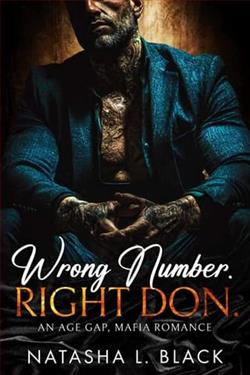Page 26 of A Treacherous Trade
Or… was I giving this entirely too much consideration? I meant no one harm, only my help, what little I could think to give.
And if I were honest, I felt I owed Amelia. If I couldn’t bring myself to give her the truth that would break her, then I could at least help her uncover this one.
The screech of a wrought-iron gate broke my reverie, and I startled just in time to see a lanky form sauntering toward me, his hands lifted to his mouth as he lit a cigarette in a long, expensive-looking holder. His smoking jacket was the deepest, richest amber that brought out the garnet undertones in his whisky-colored eyes.
My neighbor was becoming rather famous, really. A conversationalist and a man-about-town, but not merely as a dilettante and social upstart. He was a journalist, an editor, a playwright, and most recently, a novelist. I became more and more aware of how lucky I was for the times we spent alone, smoking in our gardens and gossiping about our exceptionally dissimilar days.
He was another denizen of the night. One more soaked in absinthe rather than arsenic.
Yet we understood each other… and when we didn’t, we delighted each other.
Trotting up my steps, he seized my face in both of his hands and noisily kissed each cheek twice. “I saw you coming home this very afternoon, which means you left early. Or at least before I woke,” he announced, in an accent so entirely cultured, one might forget he was from Ireland as well. “Tell me you went to work today. Tell meeverything. Who is dead? Anyone I know?”
“Good afternoon, Oscar,” I said with mock censure. “It’s lovely to see you again, as well. I’m faring slightly better, thank you for asking.”
He wrinkled his aquiline nose and pursed lips entirely too full to belong to a man. “Ohplease, do let us dispense with the pleasantries. Life seems as short as a winter’s day, and if I’m honest, I have so much to tellyou. But I want you to go first.” Flapping the hand with the cigarette holder at me, he motioned for me to begin. “I demand you reveal what job was interesting enough to pull you out of your self-imposed sequestration.”
In pure, smooth, Oscar Wilde fashion, he mentioned the fact that we hadn’t seen each other in some months without quite mentioning it at all. There was a shadow of approbation beneath his ribbing, but nothing truly serious.
It was more fondness than frustration I released in my long-suffering sigh. “If you’re bursting at the seams to tellmesomething, Oscar, why don’tyoujust go first?”
He took a long drag and let the smoke escape with his words. “Because, darling, the suspense is terrible, and I need it to last.”
“That doesn’t at all seem practical.” I wrinkled my nose at him.
“To the devil with practicality, is what I say.” His eyes were brighter than usual, his energy almost frenetic. “Especially when anticipation isthisdelicious. Now tell me what you’ve been about, and if it’s not that riveting or salacious, then fill in those parts with fiction.”
I snorted. “What use has fiction in this case? Practicality is what keeps the world turning. One must think realistically to survive.”
“No,youmust think thus to survive,” he corrected me with a grand flourish. “No great artist ever sees things as they really are. If he did, he would cease to be an artist. Reality is ugly and rude. Therefore, fiction is necessary for a reason, my dear, and I must live in a bit of whimsical fantasy if I’m to continue to create.”
“I don’t suppose I can argue with you there.”
“Of course you cannot. Besides, I’m not here to argue. I’m here to listen. Now tell me what you’re up to. I shan’t ask again.”
So I did.
Leaving out names, of course, I regaled him about Alys and Jane, how they’d lived and how they’d died. About their distraught madam. And about Amelia, the former companion who wanted nothing more desperately than to help.
Oscar’s eyes were as wide as a barn owl’s when I revealed our plans for me to establish faith with the working women, and learn what I could about the victims, so I could help to find their killer.
Once I finished, I felt quite incredible that I’d made Oscar Wilde, one of London’s most loquacious raconteurs, speechless for a full minute.
He finally said, “In my experience, the world is divided into two classes, those who believe the incredible, and those who do the improbable. You, my dear, are an alluring and alarming concoction of both.”
I blinked twice, wondering if he’d complimented me or not. “Thank you?” He didn’t elaborate, so I went on. “I’m not doing anything unheard of. I’m merely spending a few nights at The Orchard in order to ask pertinent, if somewhat indiscreet, questions.”
“Questions are never indiscreet, though answers sometimes are.” He studied me for a moment longer, as if debating saying his thoughts out loud.
“You think they’ll see through me?” I asked, voicing my own secret anxieties.
He dipped his cleft chin. “I think you’ll need to be careful how you approach this. You, my dear, are not the kind of woman who works in these places, and I’m more worried about the men who frequent them than the women. I mean, I would take one look at you and know you aren’t a whore.”
Suddenly terribly glum, I picked at a fleck of peeling paint on the balcony. “I made that very argument to the bawd. I’m too old to pass for a courtesan, aren’t I? Too freckled and bespectacled and plump and—”
“Fiona!” Oscar seized my shoulders and gave me a little shake, spilling some of my tea. “No, that’s notat allwhat I was implying. Lord help me, but I’m nothing if not an aesthete. I choose my friends for their good looks, my acquaintances for their good characters, and my enemies for their intellects.”
“And unfortunately for you, one can’t pick one’s neighbors,” I teased.















